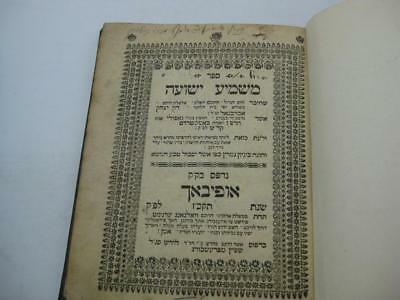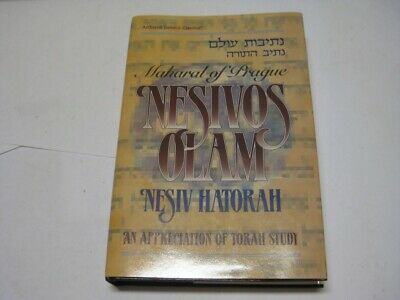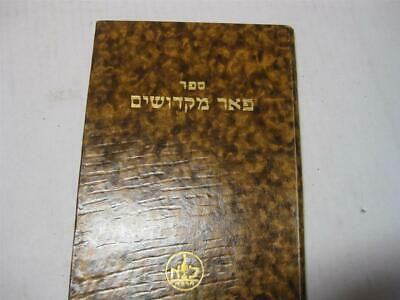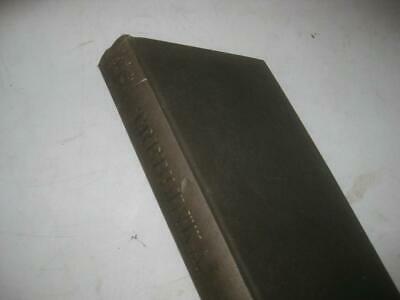-40%
1767 Offenbach ! MASHMIAH YESHUAH by DON ISAAC ABRABANEL Antique/Judaica/Jewish
$ 71.27
- Description
- Size Guide
Description
RBR11767 Offenbach ! MASHMIAH YESHUAH by DON ISAAC ABRABANEL
HEBREW
VG CONDITION, CLOTH COVERS, NICE COPY
[1], 112 ff., 8°, 194:155 mm
Mashmi'a Yeshu'ah (Announcing Salvation) - commentary on the messianic prophecies in the prophetical books by Don Isaac b. Judah Abrabanel (1437–1508), statesman, philosopher, and biblical exegete. Born in Lisbon, Abrabanel received a broad education embracing Jewish religious philosophy beside the traditional disciplines, also the basic works of classical literature, and the writings of the foremost Christian theologians, he studied Talmud under Joseph b. Abraham Hayyun. He was among the first Jewish scholars to be familiar with the concepts of humanism and the world of the Renaissance and to reflect their influence. He matured early. While still a youth he composed a treatise on Providence and prophecy, Ateret Zekenim, and at the age of 25 gave discourses in the synagogue on the Book of Deuteronomy, which he subsequently committed to writing.
Like his father Judah, Abrabanel engaged successfully in both commerce and state finance. After his father died he succeeded him as treasurer of King Alfonso V of Portugal. His importance at court was not restricted to his official sphere of activities. Of a loan to the state of 12,000,000 reals raised from both Jews and Christians in 1480, more than one-tenth was contributed by Abrabanel himself. When in 1471, two hundred fifty Jewish captives were brought to Portugal after the capture of Arcila and Tangier in North Africa by Alfonso V, Abrabanel headed the committee which was formed in Lisbon to raise the ransom money. As the Jews of Portugal were unable to maintain the captives unaided, Abrabanel asked Jehiel of Pisa to raise money for the purpose from Italian Jewry.
Abrabanel was also in touch with cultured Christian circles. His connections with members of the aristocracy were not founded only on business but also on the affinity of humanism. His letter of condolence to the count of Faro on the death of his father, written in Portuguese, provides a striking example of this relationship. The period of tranquillity in Lisbon ended with the death of Alfonso in 1481. His heir, JoCo II (1481–1495), was determined to deprive the nobility of their power and to establish a centralized regime. The nobles, led by the king's brother-in-law the duke of BraganLa and the count of Faro, rebelled against him, but the insurrection failed. Abrabanel was also suspected of conspiracy and forced to escape (1483). Although denying guilt, he was sentenced to death in absentia (1485). He evidently managed to transfer a substantial part of his fortune to Castile beforehand, and stayed there for a while in the little town of Segura near the Portuguese border. Abrabanel attributed his misfortunes to the fact that he had wasted his time in the service of an earthly ruler. He therefore decided to devote the rest of his life to religious study. The first task he set himself was to write a commentary on the earlier prophets, which the majority of exegetes had passed over, considering that his political experience should enable him to interpret them. He concluded his commentary on the books of Joshua, Judges, and Samuel within six months, but before he had finished his commentary on Kings he entered the service of Ferdinand and Isabella of Castile (1484). He was in AlcalF de Henares in 1488 and in 1491 in Guadalajara, where he visited the academy of Isaac Aboab II. The influential Abraham Senior of Segovia enlisted his cooperation in tax farming, and Abrabanel was allocated districts for this purpose in the central and southern parts of the country. His activities were of the widest scope: he loaned enormous sums of money to the royal treasury for special purposes, including 1½, million gold ducats to meet the cost of the war with Granada (1491–92). After the edict of expulsion of Spanish Jewry had been signed, on March 31, 1492, both Abrabanel and Senior tried in vain to obtain its revocation. Abrabanel relinquished his claim to certain sums of money which he had advanced to Ferdinand and Isabella against the tax farming revenues, which he had not yet managed to recover. In return he was allowed to take 1000 gold ducats and various gold and silver valuables out of the country with him (May 31, 1492).
Abrabanel sailed from the port of Valencia to Naples. Here he completed his commentary on Kings (fall 1493). But he was again prevented from devoting his time to study for long. The king of Naples Ferrante I appointed him to a position similar to that he had formerly held in Castile. Abrabanel continued in this after Ferrante's death in 1494, under his son Alfonso II. Abrabanel's home was looted when the French sacked Naples (1494), and his library which he had brought from Spain was destroyed. He now followed the royal family to Messina, remaining there until Alfonso died in June 1495. Subsequently he removed to Corfu where he began his commentary on Isaiah (summer 1495). On the French withdrawal from the kingdom of Naples, Abrabanel returned there and settled in Monopoli (Apulia), where early in 1496 he completed the commentary on Deuteronomy (Mirkevet ha-Mishneh), which he had begun in Lisbon, as well as his commentaries on the Passover Haggadah (Zevah Pesah), and on Avot (Nahalat Avot). Of the same period are his works expressing the hopes for redemption which explain contemporary events as messianic tribulations—Ma'yenei Yeshu'ah, Yeshu'ot Meshiho, and Mashmi'a Yeshu'ah. The summation of his religio-philosophical concepts is to be found in his exposition of Maimonides' Guide of the Perplexed, already begun while Abrabanel was in Spain, and in his refutations of some of Maimonides' theories, Shamayim Hadashim, Rosh Amanah (1505), and Mifalot Elohim. In 1503, at the suggestion of his son Joseph he settled at last in Venice. He was engaged in negotiations between the Venetian senate and the kingdom of Portugal in that year, for a commercial treaty to regulate the spice trade. He now finished his commentaries on Jeremiah (published 1504), the minor prophets, Genesis and Exodus (published 1505), and Leviticus and Numbers (published 1579). In a reply to an enquiry from Saul ha-Kohen of Candia in 1507, he mentions that he was engaged in composing his book Zedek Olamim, on recompense and punishment, and Lahakat ha-Nevi'im, against Maimonides' conceptions on prophecy (a new version of Mahazeh Shaddai which had been lost in Naples), and in completing his commentary on the Guide. Abrabanel died in Venice and was buried in Padua. Owing to the destruction of the Jewish cemetery there during the wars in 1509, his grave is unknown.
We have over 50,000 Jewish Books in Stock, please make sure to check out our
Our eBay Store
Questions, comments, Requests?
OUR STORE NUMBER IS 347-492-6508
Orders can be processed over the phone as well
Our storefront location is at Mizrahi Book Store
3114 Quentin Rd
Brooklyn NY 11234
Visitors are welcome by Appointment
COMBINED SHIPPING DISCOUNTS:
There is off each additional item paid for and shipped together, which makes the shipping just .99 for almost all additional items. Please note that purchases must be paid for at once, not individually to qualify for the discount. If you plan on bidding on additional items, please hold off payment until done purchasing. This discount should be deducted automatically, please contact us if for some reason it does not. Priority mail is available upon request.
STORE HOURS
:
Our storefront is located at 3114 Quentin Rd, Brooklyn, NY, 11234. Visitors are welcome by appointment, our hours are Sunday-Thursday 10 am - 6:30 pm and Friday 10 am - 1 pm. We are closed on Saturday and Jewish Holidays. Orders can be placed over the phone at 347-492-6508
INTERNATIONAL BUYERS
:
For most individual books, we ship first class mail. Price is by weight, and this service is tracked. For multiple purchases, we usually use Priority Mail, a flat rate envelope for ( to Canada) can fit 3 Regular sized books and a flat rate box for ( to Canada) can fit 8-10 books of average size. A large flat rate box for ( to Canada is available as well and can fit up to 18 books, depending on size. Oversized books are more expensive to ship, please ask for shipping quote for multiple books in advance to prevent any misunderstandings. International postage costs are subject to USPS yearly rate increases.
RETURN CUSTOMERS:
Return customers get 7% off every order, from the second shipment and on. This is not deducted automatically, so please request an invoice and we'll send one over asap.
REFUNDS:
We offer full refunds within 14 days of purchase.
QUESTIONS
:
We are here for you and usually respond immediately, feel free to contact us with any questions or concerns you may have.
1ST EDITIONS:
We try to be precise when marking the edition, but if you are looking for first editions only, please ask us to verify the edition before purchasing, to prevent any misunderstandings. First Edition can unfortunately mean too many things.
WANT LIST
: Looking for something and don't see it? Let us know and we'll look out for you. We go through tens of thousands of books a year and we'll be glad to help.
SELL US YOUR BOOKS
:
We purchase Jewish books and any books of Jewish interest, used, rare and antique books and collections. Languages we specialize in are English, Hebrew, Yiddish, German, Spanish, Ladino, Russian and French. We purchase over 60,000 Jewish books a year and will travel to purchase libraries. Please contact us for details
DISCLAIMER
:
We sell via our storefront as well and thus reserve the rights to end an auction early if there are no bids. If interested in placing a bid late in the auction period, you can let us know to ensure it is not sold in the interim.
The descriptions we use for our books offered, may come from a variety of sources, such as standard reference books, auction catalogs, the Publishers' descriptions, online resources and customer reviews.... If you feel any specific description violated third part rights, please contact us and we will have it removed immediately.
Pictures sell!
Auctiva offers Free Image Hosting and Editing.
300+
Listing Templates!
Auctiva gets you noticed!
The complete eBay Selling Solution.

















